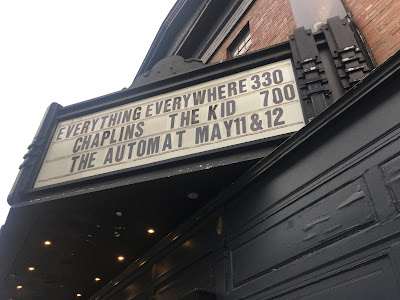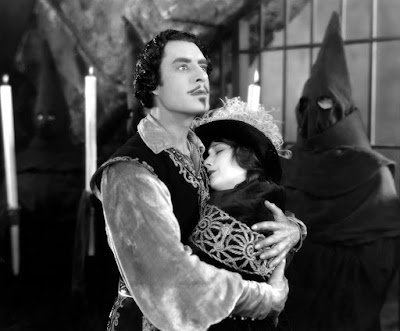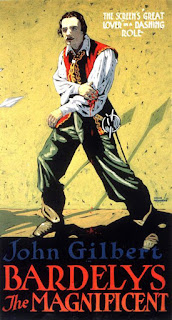This weekend, in honor of the upcoming Indianapolis 500, we're screening 'The First Auto' (1927), a Warner Bros. drama set at the turn of the previous century, at the dawn of the auto era.
Showtime is Sunday, May 22 at 2 p.m. at the Town Hall Theatre in Wilton, N.H. A lot more info is in the press release below, including the ironic death of actor Charles Emmett Mack in a car accident prior to the film's completion.
Now, a look back at some recent shows. It's been a busy month and I'm behind on keeping up this diary, so here goes.
• A screening of the John Gilbert swashbuckler 'Bardelys the Magnificent' (1926) drew cheers, surprisingly, from the audience on Wednesday, May 11 at the Flying Monkey Moviehouse in Plymouth, N.H.
I say "surprisingly" because the cheers came during the film's climax towards the end of a screening that otherwise elicited practically no audible response from those attending.
Well, you never know. I think part of it is that the climax to 'Bardelys' is truly top-notch: Gilbert's title character, condemned to death and actually on the gallows, suddenly makes a break for it.What follows is a remarkable sequence of choreographed action in which Gilbert eludes his pursuers, matching swashbuckling legend Douglas Fairbanks in creative and athletic stunting.
To me, the cheers and applause was music to my ears, as it meant people were following the story and cared about this character's fate after all.
Also, it was very nice to have a regular attendee of the Flying Monkey silent series come up afterwards to say the music I came up with for the famous "boating romance" scene in 'Bardelys' really fit the scene and gave it extra depth.
I assume she was talking about the music, and not the pond that John Gilbert and Eleanor Boardman are seen gliding over.
• Harold Lloyd's 'For Heaven's Sake' (1926) opened this year's silent film series in Brandon, Vt., preceded by a Weiss Bros. short 'Danger Ahead' (1926) just to show two contrasting types of silent comedy.
I've accompanied 'For Heaven's Sake' several times recently (in celebration of its new 'public domain' status) and I've noticed something strange about the film that I've not read anything about.The picture clocks in at 58 minutes, or just under an hour—rather short for a Lloyd feature in between 'The Freshman' (1925, 76 minutes) and 'The Kid Brother' (1927, 84 minutes).
I know Lloyd had trouble with it in production, and even finding a suitable title was difficult. The material just didn't gell, which I guess will happen when you make films in the semi-improv way the silent clowns employed.
And critics have sometimes pointed out that the climactic "race to the altar" lacks drama or suspense because there's no real reason in the story for Harold to hurry, other than he doesn't want to be late.
I mean, he's already phoned his bride before commencing on a wild ride across the unnamed city. Along the way, the antics of Harold's five sozzled roughneck friends are amusing, but are no match for other high-stakes situations such as the iconic building climb of 'Safety Last' (1923).
Contrast the climax of 'For Heaven's Sake' that with 'Girl Shy' (1924), where Lloyd absolutely MUST get to the church as fast as possible, as his girl is already at the altar, exchanging vows with a bigamist. I've accompanied screenings of this film where people are literally shouting "Hurry up!" at the screen.
Alas, this doesn't happen in 'For Heaven's Sake,' as the stakes aren't nearly so high.
And I wonder if something didn't quite go right in the oven, and if something larger and more sinister was originally planned for the film, but somehow got cut.
For starters, there's the film's stunted length.
And then there's also the credits: getting top billing is James Mason—the silent one, not the James Mason who later starred in '20,000 Leagues Under the Sea.' Mason is billed as 'The Gangster,' presented as one of the lead roles.
But Mason barely appears in the film, and always on the sidelines.
Much more prominent is reliable celluloid bully Noah Young, who interacts regularly with Lloyd throughout the film and plays what turns out to be the film's key heavy. But unlike Mason, he doesn't merit any mention or credit in the opening titles.
To me, it seems likely that Lloyd and his team intended to develop the "gangster" theme more thoroughly to create a situation to bring real danger to our protagonist J. Harold Manners, the richest man in town.
Lloyd's "meet-cute" with Jobyna Ralston in 'For Heaven's Sake' (1926).And the potential is there. If there was a reason for a gangster to stop Lloyd's wedding to Jobyna Ralston's mission worker (maybe a romantic rivalry?), then maybe Lloyd could have been kidnapped by the bad guys (not his rich friends), creating suspense on the level of 'Girl Shy' or 'Safety Last.'
Maybe that's the role Mason was intended to play. After all, he played a similar baddie (with designs on Ralston) in Lloyd's comedy 'Why Worry?' (1923).
Even better, Mason could have kidnapped Ralston, not Lloyd, forcing our Hero to race to her rescue, maybe with his drunken friends in tow along the way. Great suspense could be generated, with Lloyd striving to rescue Jobyna while keeping five inebriated friends from danger.
But there are signs that whatever role Mason was supposed to play, most of it wound up on the cutting room floor.
Instead, in 'For Heaven's Sake,' Lloyd gets kidnapped by his fellow rich twits, which doesn't lead to any significant peril for our hero, and little edge-of-the-seat suspense for an audience.
There are accounts that the "gangster" angle planned for 'For Heaven's Sake' wound up being reworked for 'Speedy' (1928), But it's really too that a way wasn't found to use it to amp up the tension in 'For Heaven's Sake.'
I mean, for heaven's sake.
• Sunday, May 15 brought Buster Keaton's 'Our Hospitality' (1923), which I accompanied at the Center for the Arts in Natick, Mass.
Great screening, audience with the picture all the way. Lots of questions during a very extended Q & A following the film.
An original lobby card promoting 'Our Hospitality' (1923).One attendee observed that Keaton was very hard on the South and its people. This prompted an interesting discussion, with me saying that Keaton wasn't trying to "say" anything, but just using a family feud and what would have been seen as antiquated customs even in the 1920s to drive a story.
Keaton wasn't a political artist in the same way that his rival, Mr. Charles Chaplin, was, especially later in life. With Keaton, I said it would be a misstep to read anything like a contemporary political agenda into his work, which was produced a century ago. (And in the case of 'Our Hospitality,' was set 100 years before that.)
And that led into a discussion of 'The General' (1926), and how Keaton's Civil War epic portrayed the South as heroes and the North as villains—again, just for story-telling purposes, not to promote any kind of agenda, hidden or otherwise.
Speaking about 'The General' later in life, Keaton observed that "you can always make a villain out of the North, but you can never make a villain out of the South."
It's my theory that he was talking about box office: in the 1920s, with the Civil War still within living memory, any film in which the South was portrayed as the bad guys and the North as triumphant wouldn't do business in a big part of the nation.
And now, it's on to 'The First Auto' (1927), which I'll accompany on Sunday, May 23 at 2 p.m. at the Town Hall Theater in Wilton, N.H.
Let me know if you need a ride!
* * *
WEDNESDAY, MAY 11, 2022 / FOR IMMEDIATE RELEASE
Contact Jeff Rapsis • (603) 236-9237 • jeffrapsis@gmail.com
'The First Auto,' silent car racing drama with live music, on Sunday, May 22 in Wilton, N.H.
Movie's leading man ironically killed in car crash during filming, but Warner Bros. still completed and released the picture
WILTON, N.H.—It was intended to be a nostalgic drama about the transition from horses to automobiles in the early 1900s.
But
during filming, 'The First Auto' (1927) took a tragic behind-the-scenes
turn when leading man Charles Emmett Mack was killed in a car accident.
Mack, a popular 1920s star, died in a crash while driving to a racetrack to shoot sequences for the nearly completed movie.
Despite
Mack's death at age 26, Warner Bros. finished the picture, altering the
ending so that his character didn't need to appear on-screen.
'The First Auto' will be screened on Sunday, May 22 at 2 p.m. at the Town Hall Theatre, 40 Main St., Wilton, N.H.
Admission is free; a donation of $10 per person is suggested to help defray expenses.
The
screening will feature live accompaniment by Jeff Rapsis, a New
Hampshire-based composer who specializes in creating music for silent
films.
'The First Auto' is being shown in honor of the upcoming
Indianapolis 500, the classic road race that takes place each Memorial
Day weekend.
Opening in 1895, 'The First Auto' follows the story
of a prosperous stable owner (Russell Simpson) whose son (Charles Emmett
Mack) becomes fascinated with the then-new "horseless carriages," or
automobiles.
After the two clash repeatedly, the son moves to
Detroit to work in the auto business. By 1905, he's become a successful
race car driver.
Things come to a head when the son secretly enters a race back in his old hometown—a race that the father intends to sabotage.
Griffith began using Mack in small on-screen parts, which led to a career in front of the camera as a popular 1920s star.
He co-starred in several films with fellow young actor Neil Hamilton, who would much later go on to play Commissioner Gordon in the 1960s 'Batman' TV series.
Among the large cast in 'The First Auto' is actor William Demarest, who would go on to play Uncle Charlie in the long-running sitcom 'My Three Sons.'
The movie also features a cameo appearance by legendary race car driver Barney Oldfield, who first broke the 60 mph speed mark in 1903.
Oldfield served as technical advisor for the race sequences to ensure period authenticity.
The film was directed by Roy Del Ruth; writers included a young Darryl F. Zanuck, who would go on to create 20th Century Fox, a studio he ran for many decades.
'The First Auto' is part of the Town Hall Theatre's silent film series, which aims to show early movies as they were meant to be seen—in high quality prints, on a large screen, with live music, and with an audience.
"All those elements are important parts of the silent film experience," said Rapsis, who will improvise a musical score for 'The First Auto.'
"Recreate those conditions, and the classics of early Hollywood leap back to life," he said.
‘The First Auto’ will be shown with live music on Sunday, May 22 at 2 p.m. at the Town Hall Theatre, 40 Main St., Wilton, N.H.
Admission is free; a donation of $10 per person is suggested to help defray expenses.
For more info, visit www.wiltontownhalltheatre.com or call (603) 654-3456.











